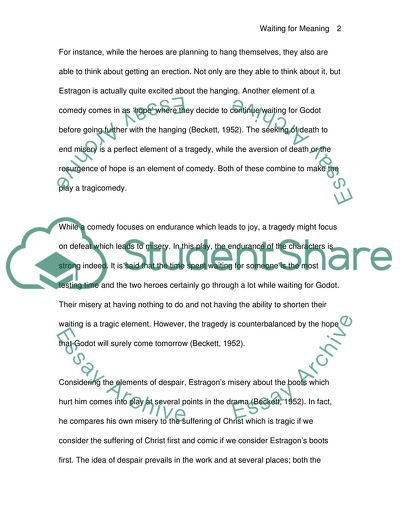
- Home
- Free Samples
- Premium Essays
- Editing Services
- Extra Tools
- Essay Writing Help
- About Us
- Studentshare
- Subjects
- Miscellaneous
- Waiting for Godot: a tragicomedy
Waiting for Godot: a tragicomedy - Essay Example

- Subject: Miscellaneous
- Type: Essay
- Level: Masters
- Pages: 4 (1000 words)
- Downloads: 0
- Author: quintenkemmer
Extract of sample "Waiting for Godot: a tragicomedy"
The combination of tragedy and comedy is perhaps the greatest genius of this play. Considering the elements of a tragedy we can observe ideas like the death of a hero, an error made by a character, a character who suffers greatly, a separation from friends and a loss of hope. A comedy could give us images like the endurance of a hero, the joy of success, pleasure at reunion and the hero coming over great odds to win a victory. Clearly, all these elements are present in the play and are worked into situations and conversations between the characters with great skill.
For instance, while the heroes are planning to hang themselves, they also are able to think about getting an erection. Not only are they able to think about it, but Estragon is actually quite excited about the hanging. Another element of a comedy comes in as ‘hope’ where they decide to continue waiting for Godot before going further with the hanging (Beckett, 1952). The seeking of death to end misery is a perfect element of a tragedy, while the aversion of death or the resurgence of hope is an element of comedy.
Both of these combine to make the play a tragicomedy. While a comedy focuses on endurance which leads to joy, a tragedy might focus on defeat which leads to misery. In this play, the endurance of the characters is strong indeed. It is said that the time spent waiting for someone is the most testing time and the two heroes certainly go through a lot while waiting for Godot. Their misery at having nothing to do and not having the ability to shorten their waiting is a tragic element. However, the tragedy is counterbalanced by the hope that Godot will surely come tomorrow (Beckett, 1952).
Considering the elements of despair, Estragon’s misery about the boots which hurt him comes into play at several points in the drama (Beckett, 1952). In fact, he compares his own misery to the suffering of Christ which is tragic if we consider the suffering of
...Download file to see next pages Read MoreCHECK THESE SAMPLES OF Waiting for Godot: a tragicomedy
Harold Pinter: An Absurdist-Existentialist Writer in His Play The Room
Waiting for Godot Play
Waiting For GODOT Play
Representation of war in media
Becketts Play and Heaneys Poetry
The Theme of Madness
The Theatre of the Absurd
Abuse of Power in the Books The Tempest, Waiting for Godot and Billy Budd, Sailor

- TERMS & CONDITIONS
- PRIVACY POLICY
- COOKIES POLICY